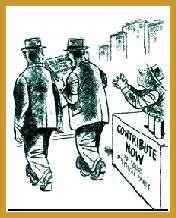11.3 The Tactics of Interest Groups
Interest Groups make use of a wide range of political techniques to reach their goals. Various groups use different tactics depending on the size of the group, its cohesion, its organizational structure, the skills of its leaders and the external situation.

Itís terrible how the big guys run politics!
Exhibit 11.2
Lobbying
11.3a Lobbying
Lobbying could be described as the pressure that
is brought to bear directly upon public officers, in order to influence
and control the decisions and actions of the government. Most of
the organizations that maintain lobbies are highly specialized establishments
like the National Fertilizer Association, Retired Officers Association,
and Institute of Shortening and Edible Oils. Usually the lobbyists
who work for these associations are hardworking attorneys highly
experienced in the ways of Washington. It is part of their job to
supervise a handful of bills. They also have to keep in touch with
some administrative officials. These lobbyists play a useful role
in the modern system of government. They are a source of views and
information to the harried Congressman or administrator who has
to go through piles of paper or has to appease conflicting interests.
Lobbyists for the big groups, carry out their operations, on a more sophisticated scale. They not only are better known than some senators, but also better paid and better staffed. Since the groups represented by them have very broad interests, these lobbyists have to watch a wide variety of bills, relating to every phase of the government. Hence they try to exert pressure in the Congress through regular committees, appropriation committees, individual legislators and even on the floor of the House and Senate. They are capable of mobilizing their organizations back home so that a large number of letters, telegrams and petitions reach Washington. They have the knowledge for drawing up laws, testifying before committees, and helping to speed up or slow down the process of legislation. They could rightly be regarded as experts in the art of influence.
Lobbyists have been criticized for their direct role in the process of law making as well as with regard to their relations with government officials. The links between congressional committees, administrative agencies and the lobbying working with both of these, have been referred to as an iron or cozy triangle.
|
Index
11.0
- Introduction
11.1 Types of Interest Groups
11.2
The Functions of Interest Groups
11.3 The Tactics of Interest Groups
11.4 The Mass Media and Political Coverage
Chapter 12
|